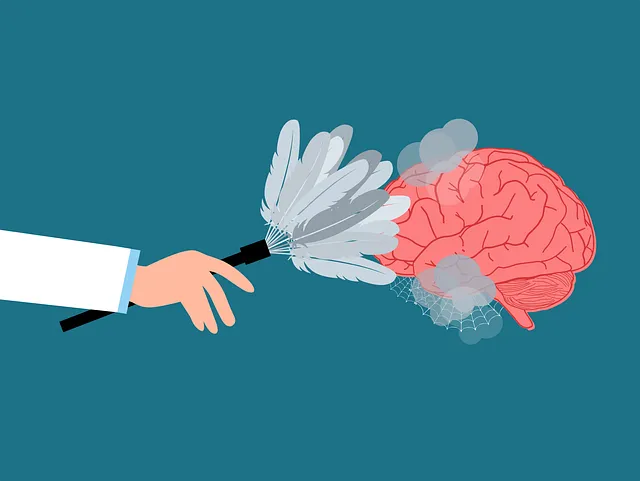Burnout among healthcare providers at Kaiser Permanente Boulder is a growing concern, driven by high workloads, long hours, and demanding patient interactions, leading to emotional exhaustion, depersonalization, and reduced job satisfaction. Early signs include physical exhaustion and irritability. To combat this, Kaiser Permanente has implemented initiatives like the Community Outreach Program, Mental Wellness Coaching Programs, and an engaging Mental Wellness Podcast Series. Their dedicated behavioral health phone number Boulder offers accessible support, promoting mental wellness awareness and reducing stigma. Phone-based interventions provide on-demand access to expert counselors, coping strategies, and personalized resources for emotional well-being. Holistic strategies, such as Emotional Intelligence training and mindfulness practices, maintain healthcare providers' passion and dedication while improving patient care quality. Collaborative efforts like community outreach programs and risk assessments further support mental health professionals at Kaiser Permanente Boulder, fostering a resilient team environment.
Healthcare provider burnout is a growing concern, impacting patient care and well-being. This article explores comprehensive strategies to prevent burnout among healthcare workers, focusing on innovative models and accessible resources. We delve into the challenges, offering insights from Kaiser Permanente Boulder’s successful behavioral health support system. Discover how phone-based interventions, holistic practices, team collaboration, and peer support can foster resilience. For personalized guidance, consider reaching out to Kaiser Permanente’s behavioral health phone number in Boulder.
- Understanding Burnout Among Healthcare Providers: Symptoms and Impact
- Kaiser Permanente Boulder: A Model for Behavioral Health Support
- Phone-Based Interventions: Accessing Expert Help from Anywhere
- Holistic Strategies for Burnout Prevention in Clinical Settings
- Building Resilient Teams: Collaboration and Peer Support
Understanding Burnout Among Healthcare Providers: Symptoms and Impact

Burnout among healthcare providers is a growing concern, impacting not only individual well-being but also the quality of patient care. It’s characterized by emotional exhaustion, depersonalization, and reduced personal accomplishment, often stemming from high workload, long hours, and demanding patient interactions. According to studies, healthcare professionals working at Kaiser Permanente Boulder have expressed significant stress levels, making it crucial to address burnout proactively.
The symptoms can range from physical exhaustion and irritability to emotional detachment and decreased job satisfaction. The impact is far-reaching; not only does it affect the mental health of providers, but it can also lead to errors in patient care, reduced productivity, and even higher turnover rates. Recognizing these signs early is vital. Organizations like Kaiser Permanente have implemented initiatives such as the Community Outreach Program and Mental Wellness Coaching Programs Development to support staff. Additionally, producing engaging Mental Wellness Podcast Series can foster open conversations around mental health, providing coping strategies and promoting a culture of resilience.
Kaiser Permanente Boulder: A Model for Behavioral Health Support

Kaiser Permanente Boulder has emerged as a beacon of hope in healthcare provider burnout prevention, showcasing a comprehensive approach to behavioral health support. This model emphasizes the integration of mental health services into primary care settings, recognizing that addressing mental illness stigma reduction efforts and promoting mental health awareness is crucial for overall well-being. By providing accessible resources through their dedicated behavioral health phone number, Kaiser Permanente Boulder ensures healthcare providers have easy access to necessary support.
The organization fosters a culture of self-care routine development for better mental health among its workforce. This proactive strategy involves regular check-ins, stress management workshops, and wellness programs tailored to individual needs. By prioritizing provider well-being, Kaiser Permanente Boulder aims to enhance job satisfaction and prevent burnout—a game-changer in the healthcare industry.
Phone-Based Interventions: Accessing Expert Help from Anywhere

In today’s digital era, phone-based interventions offer a convenient and accessible way for healthcare providers to combat burnout. Services like the Kaiser Permanente behavioral health phone number in Boulder provide on-demand support, allowing professionals to connect with expert counselors from the comfort of their own spaces. This innovative approach to mental wellness promotes emotional well-being by offering confidential conversations, coping strategies, and resources tailored to individual needs.
The Mental Wellness Podcast Series Production has also gained popularity as an effective Emotional Well-being Promotion Technique. These podcasts often feature experts in the field discussing topics related to resilience building, stress management, and self-care practices. By integrating such resources into their routine, healthcare providers can enhance their emotional resilience, prevent burnout, and maintain a healthier work-life balance.
Holistic Strategies for Burnout Prevention in Clinical Settings

In clinical settings, holistic strategies for burnout prevention are essential to support healthcare providers’ mental wellness and resilience. Kaiser Permanente, for instance, offers behavioral health phone numbers in locations like Boulder, demonstrating a commitment to accessible care. Beyond individual initiatives, organizations can foster a culture of emotional intelligence, encouraging open discussions about stress, workload, and personal boundaries. This creates an environment where providers feel supported and understood, reducing the risk of burnout.
Resilience building through structured programs, such as Emotional Intelligence training and Mental Wellness Podcast Series Production, can equip healthcare professionals with effective coping mechanisms. Regular mindfulness practices, self-care routines, and peer support networks contribute to a holistic approach that addresses not just symptoms but also the underlying factors contributing to burnout. By integrating these strategies into daily practice, healthcare providers can maintain their passion and dedication while delivering high-quality patient care.
Building Resilient Teams: Collaboration and Peer Support

In the relentless pursuit of high-quality healthcare, building resilient teams is a cornerstone strategy to prevent burnout among healthcare providers. Collaboration fosters an environment where professionals can share knowledge, offer emotional support, and collectively tackle challenges. Peer support systems, in particular, have proven invaluable, as mental health professionals in organizations like Kaiser Permanente Boulder can rely on their peers for advice, understanding, and coping mechanisms during stressful periods. This interconnectedness not only enhances job satisfaction but also strengthens the overall quality of patient care.
Implementing a robust Community Outreach Program can further strengthen these bonds. By engaging in community-based activities and initiatives, mental health professionals not only contribute to societal well-being but also find renewed purpose and perspective. Additionally, integrating a Risk Assessment for Mental Health Professionals into existing practices allows for early identification of at-risk individuals, enabling timely interventions and support mechanisms. Through such collaborative efforts, healthcare providers can navigate the intricate landscape of patient care with resilience, ensuring they remain equipped to deliver optimal services in alignment with comprehensive Mental Health Policy Analysis and Advocacy.
Healthcare provider burnout is a growing concern, but with the right strategies, it can be prevented. From recognizing symptoms early and understanding their impact, to implementing holistic approaches like those seen at Kaiser Permanente Boulder with their behavioral health support systems, healthcare organizations can foster resilient teams. Phone-based interventions offering expert help further enhance accessibility. By prioritizing peer support and collaboration within clinical settings, we can create a culture that promotes well-being and prevents burnout among our most essential workers. Remember, addressing burnout is crucial for maintaining high-quality patient care.






